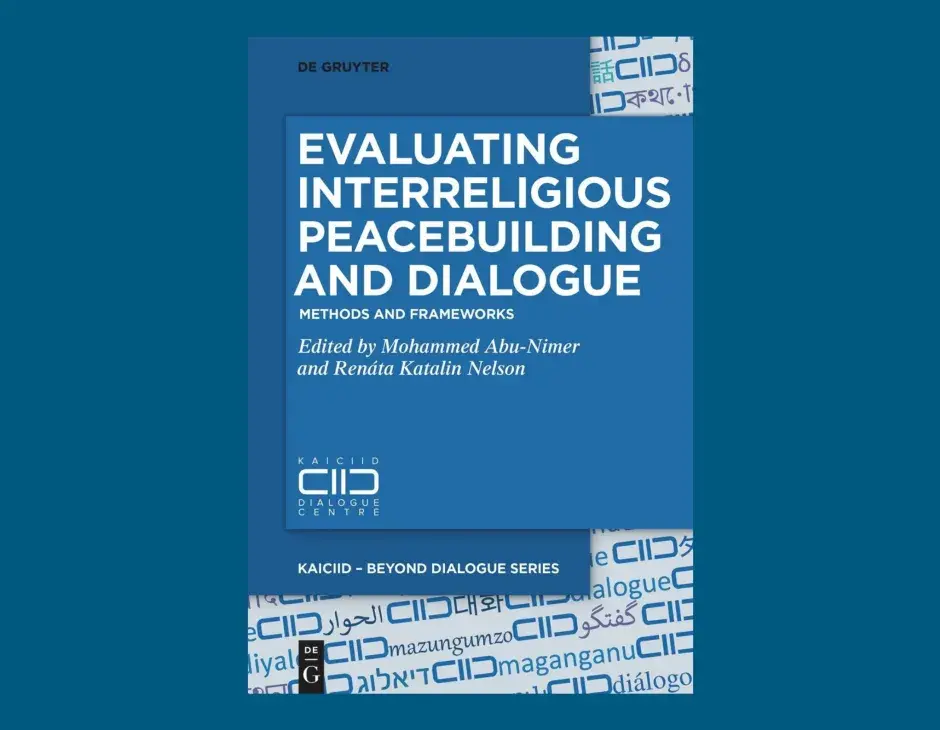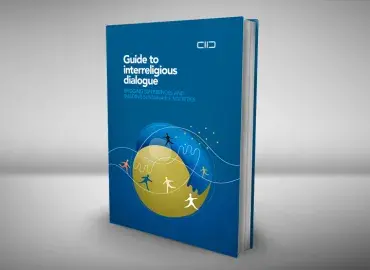New KAICIID Publication Focuses on the Importance of Evaluating Interreligious Peacebuilding and Dialogue Projects
It is vital that the proper tools and processes are in place to evaluate the outcomes of interreligious peacebuilding and dialogue initiatives, explains a new book from the International Dialogue Centre (KAICIID).
Though some progress has been made, there are still significant gaps in the alignment of interreligious dialogue and peacebuilding practitioners. It’s crucial, therefore, that ethical and theoretical evaluation frameworks and procedures are developed, concludes Evaluating Interreligious Peacebuilding and Dialogue, an open source collection of essays published by De Gruyter.
“Religion can be a positive force in building peace. Thus, evaluating interreligious peacebuilding is necessary for identifying evidence that religious actors are making important contributions to peace and social cohesion,” said co-editor Professor Mohammed Abu-Nimer, a Senior Adviser at KAICIID.
“There’s a need for capacity building of interreligious dialogue practitioners and organizations on the importance of integrating evaluation methods and tools in their work, especially on how to identify their success and evidence,” Professor Abu-Nimer added.
The importance of accountability
The anthology lays out two key advantages of interreligious dialogue and peacebuilding evaluation: increasing accountability, and learning how to be more effective in achieving change.
The former, increasing accountability, is necessary to ensure that the needs of peacebuilding beneficiaries are met with a greater degree of success. Likewise, higher levels of accountability will heighten practitioners’ ability to address changes to these needs in fragile, rapidly changing contexts. Perhaps most importantly, however, greater accountability will help ensure that peacebuilders adhere to the ‘do no harm’ principle — a doctrine designed to protect vulnerable people from additional risks during the peacebuilding process.
The learning process
The second major benefit of evaluation is that it provides interreligious dialogue and peacebuilding professionals the opportunity to learn and develop their skills. This learning process should take place throughout the duration of any given project cycle, the book explains, facilitated by the collection of data and development of effectiveness indicators at each stage.
To enhance the learning process, interreligious dialogue and peacebuilding practitioners should feel able to ask questions whenever knowledge gaps arise. Similarly, by monitoring and evaluating outcomes, peacebuilders can learn from their efforts as they work, analysing the situation at different points in the project, allowing for risk management and fine-tuned adjustments.
Bridging the divide
Evaluation can also help bridge the divide between policy makers and interreligious dialogue practitioners and peacebuilders, the essay series explains. In the post 9/11 world, bringing these parties together is particularly important, given the vital role of religious leaders in conflict resolution.
Equally, with the accelerating climate crisis and the emergence of COVID-19, faith groups can expect to have an even greater function in cultivating peace. There remains a problematic disconnect between interreligious dialogue professionals and those in charge of policy formulation, the publication shows.
“Policymakers often look to create a political peace with a strong focus on the establishment of a new government, successful elections when applicable, and representation of all sides. Interreligious dialogue practitioners are focused more on societal healing by dealing with the long-ingrained perceptions of the ‘Other’, which feed into continued prejudice, fear, mistrust, hate and other negative feelings that perpetuate divisions and could fuel future conflicts,” said Evaluating Interreligious Peacebuilding and Dialogue co-editor Renáta Katalin Nelson, KAICIID Coordination Officer.
Challenges to evaluation
The book’s essays detail a series of challenges to the fostering of greater evaluation of interreligious peacebuilding activities. The process can be slow, just as dialogue and interreligious peacebuilding are themselves gradual in nature. There is significant scepticism around the need for evaluation, with an evident lack of interest from religious or interreligious peacebuilders in applying monitoring and evaluation techniques. There can be issues of ‘squaring the circle’, with evaluation practices used for traditional peacebuilding programmes sometimes incompatible with faith-based projects.
There is a risk, also, that religion becomes instrumentalized, or that its importance is downplayed. Conversely, there is a danger that the role of religion is overemphasized, and the focus on addressing the true root causes of a conflict is lost. Gaps in the literature around monitoring and evaluation practices are also problematic, as are issues of recognition within the field of evaluation.
Potential solutions
Addressing these challenges is the fundamental aim of Evaluating Interreligious Peacebuilding and Dialogue. It does so by contributing to the emerging body of literature on evaluation, with each of its seven essays approaching the challenges to (and opportunities of) monitoring and evaluation through a different lens.
The book’s first section looks at the complexities of religious and interreligious peacebuilding, identifying the obstacles that hinder effective monitoring and evaluation. The second section describes practical tools that have been developed to help monitor and evaluate religious and interreligious peacebuilding, and highlights how these tools can be implemented in different contexts.
The book is part of KAICIID’s ‘Beyond Dialogue Series’ published by De Gruyter, which aims to bring theoreticians and practitioners in the field of interreligious dialogue from various regions of the world closer together.
Interreligious dialogue is vital to bridging divisions in an increasingly turbulent world, a new guide from the International…


